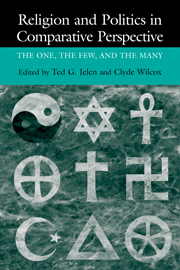Book contents
- Frontmatter
- Contents
- List of Contributors
- Preface
- 1 Religion: The One, the Few, and the Many
- 2 The Challenge of Pluralism
- 3 Catholicism, Politics, and Culture in the Republic of Ireland
- 4 Religion and Politics in Iberia
- 5 The Religious Dimension of Israeli Political Life
- 6 Between Heaven and Earth
- 7 Islamism in Contemporary Arab Politics
- 8 Religion and Politics in a Secular Europe
- 9 Religion and Democracy in South America
- 10 Looking for Hope in Central America
- 11 Religion and Politics in India
- 12 Religion and Politics in Japan
- 13 Religion and Politics in an Open Market
- 14 The Political Roles of Religion
- Index
11 - Religion and Politics in India
The Emergence of Hindu Nationalism and the Bharatiya Janata Party (BJP)
Published online by Cambridge University Press: 05 June 2012
- Frontmatter
- Contents
- List of Contributors
- Preface
- 1 Religion: The One, the Few, and the Many
- 2 The Challenge of Pluralism
- 3 Catholicism, Politics, and Culture in the Republic of Ireland
- 4 Religion and Politics in Iberia
- 5 The Religious Dimension of Israeli Political Life
- 6 Between Heaven and Earth
- 7 Islamism in Contemporary Arab Politics
- 8 Religion and Politics in a Secular Europe
- 9 Religion and Democracy in South America
- 10 Looking for Hope in Central America
- 11 Religion and Politics in India
- 12 Religion and Politics in Japan
- 13 Religion and Politics in an Open Market
- 14 The Political Roles of Religion
- Index
Summary
India was partitioned in 1947 along religious lines, creating a Hindu-majority nation of India and a Muslim-dominated Pakistan. Although religion has been the most powerful single factor in the development of Indian civilization, the official ideology of the early Indian state, and of the dominant Congress party, was secular nationalism. Hindu nationalist parties and organizations such as the Hindu Mahasabha, the Ram Rajya Parishad, the Bharatiya Jana Sangh, and the Rastriya Swayamsevak Sangh (RSS) were of marginal importance before and after India's independence. Jawaharlal Nehru, with other leaders of the Congress and the framers of the Indian constitution, committed India to secularism, and the secular Congress party dominated Indian politics for half a century. In the last two decades of the century, however, there has been a resurgence of Hindu nationalist ideology made manifest by the Bharatiya Janata party (BJP), and a concomitant decline in the consensus on secular nationalism.
The BJP, which had won only two seats in the 1984 parliamentary elections, won 161 seats in the Lok Sabha (the lower house of parliament) in 1996, and formed a government that lasted only thirteen days. In March 1998, the BJP formed a minority government after winning 178 seats in the Lok Sabha. In elections held in October 1999, the BJP increased its numbers to 182 seats, and with its allies it secured a comfortable majority (302) in the Lok Sabha. These three elections over a four-year period have changed the nature of party politics in India.
- Type
- Chapter
- Information
- Religion and Politics in Comparative PerspectiveThe One, The Few, and The Many, pp. 241 - 266Publisher: Cambridge University PressPrint publication year: 2002
- 2
- Cited by



